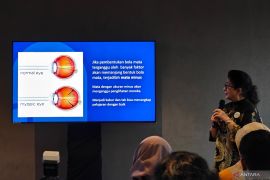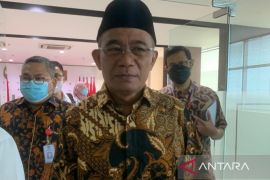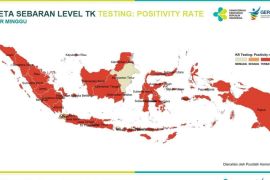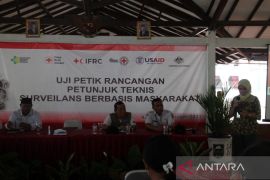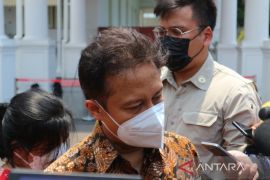The decision was made by WHO Director-General Tedros Adhanom Ghebreyesus based on inputs from the COVID-19 International Health Regulations (IHR) Emergency Committee during its 15th meeting on May 4, 2023.
The meeting was held in view of the declining COVID-19 cases in the past year, improving community immunity from vaccinations and infections, as well as declining deaths.
Globally, cases of deaths due to COVID-19 fell by 30 percent in the April 3–20 period compared to four weeks prior.
During the period, around 2.77 million people globally were infected with COVID-19 and 17,459 succumbed due to the virus.
The Emergency Committee is a committee formed by the WHO that gathers experts from various health disciplines to analyze and provide inputs on appropriate assistance when an infectious disease appears that has the potential to spread internationally.
Tjandra Yoga Aditama, an Indonesian health expert who was previously a member of the MERS-CoV IHR Emergency Committee, said various analyses regarding the COVID-19 pandemic were discussed at the COVID-19 IHR Emergency Committee's meetings.
In one meeting held on January 30, most of the members did not agree to revoke the Public Health Emergency of International Concern (PHEIC) status for COVID-19.
Aditama said that at that time, the members' consideration was based on several factors, including the number of deaths caused by COVID-19, which was still high in several parts of the world.
Throughout the pandemic, the United States recorded the highest number of COVID-19 deaths at 392,480, followed by South Korea with 330,509 deaths; Japan 251,158 deaths; India 222,784 deaths; and France 197,190.
The latest report showed that in the period from April 3–20, the US contributed the most COVID-19 deaths at 5,263; followed by Brazil with 1,255 deaths; Russia, 993 deaths; France, 871 deaths; and Iran, with 762 deaths.
In total, since the beginning of the pandemic, the WHO has recorded 765,222,932 COVID-19 cases and 6,921,614 COVID-19 deaths globally.
Apart from deaths, the COVID-19 vaccination gap between developed and developing countries for the same period was also highlighted, coupled with the existence of anti-vaccine groups that have continued to spread fake news among the public.
The IHR Emergency Committee also addressed the emergence of new COVID-19 variants, such as Kraken and Arcturus, that have been proven to cause a surge in cases in a number of countries, including Indonesia.
According to Aditama, the things that are also important are the commitment and the readiness of the state in increasing long-term vigilance against the risk of future pandemics.
Pandemic has not yet ended
Despite the revocation of the global emergency status, COVID-19 is still a threat to countries.
The WHO's decision to revoke the global emergency status of COVID-19 needs to be responded to by policymakers in each country by shifting to long-term handling of COVID-19 through a joint mitigation system against the disease as well as other infectious diseases.
According to the Emergency Committee, COVID-19 will exist in the community for a long time and threaten people with illness and even, death. Nevertheless, currently, the pandemic has not caused world chaos.
An epidemiologist from the University of Indonesia, Pandu Riono, said that the revocation of the global emergency status will shift government intervention in COVID-19 control, as it will depend on the individual initiative of the community.
The Indonesian government's intervention in responding to the COVID-19 global emergency status involved the issuance of Presidential Decree Number 11 of 2020 on the declaration of COVID-19 as a public health emergency and Presidential Decree Number 12 of 2020 regarding the stipulation of non-natural disaster of the spread of COVID-19 as a national disaster.
The policies that have been taken to tackle COVID-19 have included the public activity restrictions (PPKM) policy, which was revoked on December 30, domestic COVID-19 vaccine procurement, provision of medicines for COVID-19 patients, the public education program, and the policy related to the cost for COVID-19 patients' recovery.
In 2022, the government also spent more than Rp77 trillion to restore the national economic situation from the impact of the pandemic.
With the end of the global emergency phase, the Indonesian Government needs to revoke the health emergency status in Indonesia and be more ready to face the situation that is recovering to normalcy in the country.
Riono reminded the Indonesian Ministry of Health to continue to strengthen surveillance and education to the community, including continuing free booster vaccination.
Indonesia's situation
Health Minister Budi Gunadi Sadikin has assured that Indonesia will soon revoke the health emergency status, in line with the number of cases that has been below the WHO's safe limit of eight thousand cases per day in the past 16 months.
In two offline meetings with the WHO, Indonesia said that the COVID-19 situation in the country is under control, with an average of infections of under one thousand patients per day.
At the meetings, Sadikin also conveyed that Indonesia is ready to revoke the COVID-19 emergency status. However, since it is a global pandemic, Indonesia cannot revoke the status alone while other countries are still experiencing a surge in cases.
The WHO has told Indonesia to carry out a consultation regarding the readiness of the pandemic control system for the long term.
Ahead of the ASEAN Summit, which Indonesia will host on May 9–11, Sadikin still needs time to discuss the revocation of the COVID-19 health emergency status in the country with President Joko Widodo (Jokowi), who has the authority to revoke the status.
The Ministry of Health is currently preparing a transition strategy to end the health emergency status by prioritizing preparedness and alertness against COVID-19 in the long term.
The long-term strategy includes health surveillance in the community, ensuring preparedness of health facilities and medicines, as well as preparation of other health policies as an effort for building national health security and preparedness against future pandemics.
The community has been urged to pay attention to and implement the health protocols. Vaccinations have also continued to be carried out, especially to boost the protection of people with the highest risk.
The government is also preparing steps to revoke the pandemic status in accordance with the 2023–2025 COVID-19 Preparedness and Response Strategy, which is based on the WHO's guidelines.
The COVID-19 pandemic that has claimed many lives has presented people with the lesson to live a healthier life. Vigilance is still needed even though the emergency status has been officially revoked because it is not impossible for the WHO to reimplement the status later.
Related news: Awaiting decision on endemic status from WHO, President: Ministry
Related news: Indonesia readies strategy for ending COVID emergency status
Editor: Rahmad Nasution
Copyright © ANTARA 2023



